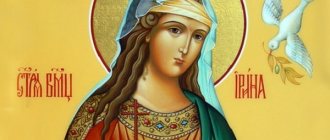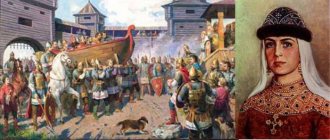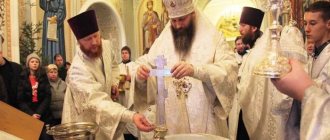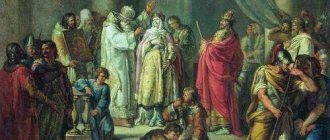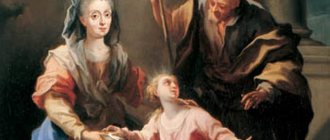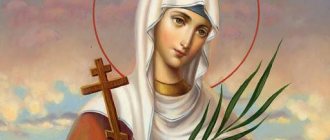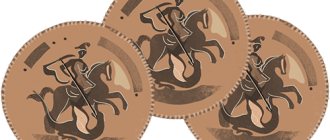Home › Name day
A saint with the name Alla is revered 1 time - Alla of Goth, martyr. The female name Alla has Ancient Greek roots, it means: “goddess, other, able.” This characterizes female representatives as people for whom everything goes well. They do not have difficulties learning new materials or mastering a new profession.
| Full name: | Alla |
| Church name: | Alla |
| Meaning of the name: | from the ancient Greek “alle” - “other”, “other” from the ancient German name Alla Alle, a short form of names containing the element al - “all”, “all” from the pre-Islamic goddess Allat, translated from Arabic - “goddess” in translation from Hebrew - “goddess”, “pistachio tree” |
Congratulations to Alla on her name day
Knowing everything, Beautiful goddess - So, Allochka, your name testifies. And all this is not flattery, not empty chatter. Thank you for being here. Happy Angel Day, dear!
Alla, happy angel day, dear, Be as beautiful, Be the happiest, And forget about the bad. I wish you a lot of joy, I congratulate you on this holiday. You deserve good luck, if only you were richer!
Alla, on these name days let there be a lot of warmth and light. Let your friends all gather, Let all your talents awaken. I wish you drive, creativity, courage, and positivity, so that the holiday ends coolly: with fireworks and fireworks!
Allah, today is your name day! And this is a Holiday, whatever one may say, Angel Day, Allusya, a good reason - Therefore, accept wishes from your brother: I wish to merge with Tenderness, And live with Lady Luck, Never meet with Longing, Be friends with Strong Love. Even if it’s difficult, don’t be sad! Look into Madame Bede's face. Be your own boss and stand next to Happiness everywhere!
Our beloved Alla! On your name day, I wish that luck always smiles on you, every day of the year. Make big plans and dream the most incredible things. After all, in life everything is possible. You just have to start, and opportunities will appear on their own.
Ancient Gothia
All events took place in Gothia around the 4th century. There was a time when this country maintained stable relations with the Roman Empire, and therefore there were no prohibitions for Christians regarding beliefs and worship. They quietly engaged in missionary work, built churches and monasteries, but then all state power passed into the hands of Athanaric (according to another version - Ungerikhe), who immediately hated Christians, since he was an inveterate pagan. He declared a real hunt for them: true adherents of the faith were caught and massacred. The orders and death sentences of this ruthless tyrant were heard throughout the country. With his ardent speeches, he sowed terrible hatred towards believers in Christ in the hearts of the pagans.
The name Alevtina (Valentina) in the Orthodox Saints
There are many versions about the meaning and origin of the name Alevtina. According to one of them, it is a distortion of the Latin name Valentina (strong). It turns out that until the 18th century, in various church chronicles, the name Valentina was written as Iualentina, and therefore, in common parlance, it was quite possible that the first three letters could disappear, and the remaining word was supplemented with other letters by ear, and it turned out to be Alevtina. Despite this, Alevtina and Valentina are two different worldly names. But according to the Saints, the baptismal name for girls Valentin and Aleftin will be common. Sometimes the name Alevtina is given at Baptism to girls whom their parents named Albina in the world.
According to another version, the name Alevtina is of Greek origin and is translated as “reflection.” Until 1917, girls were rarely called Alevtins. Only in the 20s of the last century did it begin to gain popularity. (By the way, it was written with the letter “f”).
| In the history of Christianity, the life of only one saint with the name Alevtina is known - Alevtina (Valentina) of Caesarea. (Day of Remembrance July 29 according to the new style). Unfortunately, little information about her life has been preserved. It is only known that she was from Egypt. Together with his sister Chionia, they were together until their martyrdom. In those days, the daily life of Christians was a daily test of the strength of faith and prayer, because residents of cities and villages treated them with distrust, because they did not share the general ungodly deeds and debauchery. Today we can only assume that Saint Alevtina, like all the first Christians, accepted the teachings of Christ with her heart and stood in faith until the very end. The years of her life fell on the so-called. Great persecution of believers in the Lord. During this time, more than 3,000 Christians were killed. This command was given by Emperor Diocletian; after his death, Governor Maximian continued to torture and torment those who recognized the truth of the Savior’s words. Believers were dealt with especially cruelly in Africa. It was from there that Saint Alevtina and her sister were brought to Caesarea to the imperial palace. They refused to worship pagan idols, for which they accepted martyrdom by burning. The Holy Martyr Valentine of Caesarea is often depicted on icons with a cross and ears of wheat, which is not only a symbol of Christian believers, but also a sign of any endeavors. | Image of Saint Valentine of Caesarea |
www.krestilnoe.ru
The name Angelina in the Orthodox Saints
The name Angelina translated from Greek means “messenger” or “messenger”. Today, this once forgotten name is returning to social life. By the way, this name is given at Baptism to those girls whose parents named Angelica.
In the Orthodox calendar, only one Saint Angelina is mentioned.
Saint Angelina of Serbia (Brankovic), memorial date: September 12, December 23, July 14, August 12
She came from the Chernoevich dynasty. In her youth, her uncle gave Angelina in marriage to the tough but fair ruler Stefan Brankovich. Their life was not easy. Stefan loved his wife, and she responded to him with fidelity and devotion. Year after year, children began to appear in the family: two girls and two boys.
They had to hide in Italy for a very long time in order to protect themselves from the revenge of the Turkish side; in 1476, Stefan Brankovich died, and Angelina was left alone with four children in her arms. The Hungarian ruler gave them a plot of land to own, where they all settled together. The Church of the Apostle Luke was built on this site, where the relics of St. Stephen were transferred, which by that time began to show many miracles.
| Saint Angelina turned out to be very supportive of the Serbian people; she was affectionately called Mother Angelina. In 1509 she accepted the rank of angel, and in 1512 she founded a monastery. She could not remain indifferent to what was happening at that time in her native places; taking care of temples, churches and monastic monasteries was very expensive, and therefore she looked for help from everywhere. One day, Mother Angelina sent her spiritual father to bow to the Russian ruler Vasily the Third. She asked not to leave them in their weaknesses and to come to the rescue; she also called for the construction of a new temple where the relics of her husband would be located. The prince responded to the request; in addition to the temple, monastic cells were also built at that time. Saint Angelina lived in this monastery until her righteous death. In the life of the Venerable Angelina, her perseverance and courage are deservedly mentioned, because she had to outlive not only her husband, but also her children, who were also canonized. The relics of all members of the holy Brankovic family were kept in the Krušedol Monastery, but in 1716 the Turks burned it down. Only Mother Angelina’s brush survived. The Serbian people especially reverence this saint, considering them their intercessor before the Lord. | Icon of Saint Angelina of Serbia |
www.krestilnoe.ru
Heavenly helper
For every Christian, the day of baptism is special; on this holiday, an image of the saint of the same name would be an appropriate gift. The meaning of the icon for babies baptized with the name Galina will be to receive heavenly protection. The icon must be placed in the home iconostasis. You can hang it near the crib, just so that the child cannot reach the shrine.
An older child can be taught a short prayer - “Saint Galina, pray to God for me.” Let the child pray near the icon in the morning and evening. The meaning of prayer is to expel all vanity and unnecessary thoughts from the heart. Having become accustomed to praying from an early age, the child will then easily enter the church environment. There it will be easier to resist the temptations of the world around us, to which more and more young people are succumbing.
In this simple way, the icon of St. Galina can help in educating the younger generation. You can pray for the granting of patience, increasing faith, and protection from enemies.
Prayer to the holy martyr Leonid and the martyrs Hariessa, Nika, Galina, Kalisa, Nunekhia, Vasilisa, Theodora, Irina and others like them who suffered
O holy martyr! Extend your favorable prayers to our Lord and Creator and beg His goodness to grant us (names) everything necessary for eternal salvation, and also necessary for this temporary life: we believe without a doubt that everything is possible for you, as His true saint. Hey, holy wonderworkers! Do not disgrace our hope, but through your prayers make us heirs of being the Kingdom of Christ, so that we glorify the love of mankind in the Trinity of the glorified and worshiped God, the Father and the Son and the Holy Spirit, and your holy intercession, forever and ever.
Prayerful invocation of the saint whose name you bear
Pray to God for me, holy servant of God (name), as I diligently resort to you, a quick helper and prayer book for my soul.
In practice, the prayer to the saint is often pronounced differently, according to church custom - with the name of the rank of holiness of the heavenly intercessor, for example: “Pray to God for me, holy Archangel of God Michael...”; “Pray to God for me, holy prophet of God Elijah...”
In this part of the prayer rule it is also good to include a troparion to your patron saint, which should be known and understood.
Icon of St. Galina - what helps, meaning, meaning was last modified: July 8th, 2022 by Bogolub
What do they pray to Saint Galina for?
Surely not everyone knows what they pray to Saint Galina for and the meaning of the icon with her image. As mentioned above, the icon has a special meaning for girls with the same name, but besides this, all Christians are converted in the following cases:
- in case of doubts and cowardice,
- upon the conversion of apostates,
- during persecution.
Saint Galina helps to defend faith, truth and achieve truth.
The prayer call for help from the holy martyr sounds like this:
Pray to God for me, holy saint of God Galina, as I diligently resort to you, an ambulance and prayer book for my soul.
May the Lord protect you!
You will be interested in watching a video about the day of remembrance of the Corinthian martyrs Galina, Kondrat and others:
The third century AD was a turbulent time for the Roman Empire. Uprisings broke out periodically and foundations were shaken. The new emperor Gaius Decius, who came to power, decided to return his fellow citizens to the religion of their ancestors. He probably thought that the gods were sending troubles because people stopped making sacrifices to them so often. The icon of Galina, who suffered during this period, recalls the many martyrs who died for the faith in the Roman provinces.
The name Anna in the Orthodox Saints
The name Anna is translated from Greek as “strength”, “grace”, “mercy of God”.
Holy Righteous Anna, memorial date: December 22 August 7 September 22
Righteous Anna came from the clan of Aron, the tribe of Levi, and her husband, righteous Joachim, was from the clan of David. (It is along this line that the Savior must be born). The pious couple began to live in the city of Nazareth; until old age they had no children, which caused deep sorrow.
| Despite everything, they did not stop praying to God for the gift of a baby. One day, for the holiday, Saint Joachim brought gifts to the Lord to the temple, but the priest refused to take them, explaining that childlessness was a punishment for sins (this is what the Israelis believed). The righteous husband’s sadness knew no bounds; he withdrew into the desert and spent forty days in prayer. Saint Anna considered herself guilty of this family sorrow. While righteous Joachim was in the desert, one day she saw a nest with newborn chicks on a tree. She was so touched by this sight that in tears she began to ask the Lord to help their baby be born, so that a miracle would happen. Saint Anne promised that she would dedicate the life of this child to God. As soon as this vow was pronounced, an Angel of the Lord appeared to her, who informed her that her prayers had been heard, and the Lord would send them a Child - Daughter Mary, who would give birth to the Savior of all mankind. An angel appeared to Joachim and ordered him to go to Jerusalem. Soon Saint Anna conceived a Child and gave birth to the Most Holy Theotokos. The Holy Virgin lived in her parents' house until she was three years old, and then Her father, Righteous Joachim, brought Her to the temple. Here She was raised until adulthood. After this, righteous Joachim died at the age of 80, and Saint Anna lived for another two years. | Icon of Saint Righteous Anna |
Holy Princess Anna KashinskayaMemorial dates: August 3 (Discovery of the relics), June 25 (Transfer of the relics and second glorification), October 25 She was born in the city of Kashin. After the death of their father, Anna and her sister Vasilisa remained in the care of their uncle Konstantin Borisovich. Over the years, Anna grew and became more beautiful day by day. The news of such a beauty also reached the mother of Prince Mikhail Yaroslavovich Tverskoy. They were introduced and soon got married. They had to live in constant unrest caused by the Horde attacks. Prince Mikhail was martyred by Uzbek Khan. For a long time she could not ensure that the body of her murdered husband was delivered to Tver, however, when this finally happened, it turned out that it had not decayed. The canonization of Saint Michael took place in 1549. But the sorrows of righteous Anna did not end there. Her son Dimitri was also killed, after avenging his father. Soon Saint Anna accepted monasticism with the name Euphrosyne. The only surviving son, Vasily, begged his mother to settle in her hometown of Kashin, where the Assumption Monastery was built especially for her. It was here that she accepted the Great Schema with the name Anna. Unfortunately, until 1611 her name was forgotten. However, during the siege of the city of Kashin by the Lithuanians and Poles, the Monk Anna appeared to the sick minister of the Assumption Cathedral and ordered her coffin to be venerated, for she prayed to the Lord day and night for the salvation of their city. | Icon of the Holy Princess Anna Kashinskaya |
From that time on, the veneration of her holy relics began, which more than once led to miraculous phenomena through the prayers of the intercessor of God. In 1649 she was canonized. However, almost 40 years after these events, Patriarch Joachim doubted the righteousness of Saint Anna. This was the only case in the entire history of the Orthodox Church. He forbade veneration of the saint, canceled all days of her celebration, and ordered the icons to be confiscated. The citizens themselves petitioned the Holy Synod to cancel such an unjust decision, because every day they received grace-filled healings and help through the prayers of the saint. Such requests were rejected three times. And only in 1908, at the behest of the Sovereign, veneration of the saint was restored.
Orthodox holy wives named Anna
Dates are indicated according to the new style.
- Anna (Zertsalova), mc. February 8 (Novomuch.) November 14
- Anna April 13
- Anna (Vodolanova), mc. February 8 (Novomuch.)
- Anna (Chetverikova), mc. February 8 (Novomuch.) March 3
- Anna (Ivashkina), Spanish. February 8 (Novomuch.) December 23
- Anna (Lykoshina), mc. February 8 (Novomuch.) June 28 (St. Petersburg) October 11
- Anna (Ostroglazova), mc. February 8 (Novomuch.) November 23
- Anna (Popova), mc. February 8 (Novomuch.) January 11
- Anna (Serova), mc. February 8 (Novomuch.) June 20 (Ivan.) August 13
- Anna (Gorokhova), prmts. February 8 (Novomuch.) May 16 (But.) March 20
- Anna, prmts. February 8 (Novomuch.) February 26
- Anna (Borovskaya), mc. February 8 (Novomuch.) January 11
- Anna, MC. 10th of November
- Anna, MC. December 11th
- Anna (Efremova), prmts. February 8 (Novomuch.) February 17
- Anna (Shashkina), mc. February 8 (Novomuch.) May 11
- Anna (Blagoveshchenskaya), priest, nun February 8 (Novomuch.) March 11
- Anna (Ezhova), priest, nun February 8 (Novomuch.) August 29
- Anna (Makandina), priest, nun February 8 (Novomuch.) March 14
- Anna (Stolyarova), confessor, schema-nun February 8 (Novomuch.) June 23 (Ryaz.) December 23
- Anna Adrianopolskaya, mts. November 4
- Anna (Euphemian) of Bithynia, St. June 26, November 11 ((venerable woman who labored in male form))
- Anna Vsevolodovna, Rev. November 16
- Anna Gotfskaya, MC. April 8
- Anna (monastic name Efrosinya) Kashinskaya, Tverskaya, schema-nun, princess August 3 (Discovery of relics) June 25 (Transfer of relics and second glorification) October 25
- Anna of Leucadia, St. 5th of August
- Anna mother of the Blessed Virgin Mary December 22 August 7 September 22
- Anna of Novgorod, Venerable Princess 23 February
- Anna the Prophetess, daughter of Fanuilov September 10 February 26
- Anna the Prophetess, mother of the prophet Samuel December 22
- Anna of Rome see: Agnia (Anna) of Rome, martyrdom, virgin July 18 February 3
- Anna Selevkiyskaya (Persian), mts. December 3
www.krestilnoe.ru
